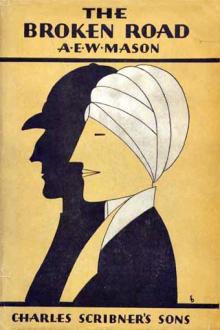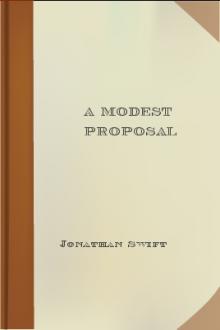The Devil's Dictionary by Ambrose Bierce (good novels to read in english TXT) 📗

- Author: Ambrose Bierce
Book online «The Devil's Dictionary by Ambrose Bierce (good novels to read in english TXT) 📗». Author Ambrose Bierce
ELYSIUM, n. An imaginary delightful country which the ancients foolishly believed to be inhabited by the spirits of the good. This ridiculous and mischievous fable was swept off the face of the earth by the early Christians—may their souls be happy in Heaven!
EMANCIPATION, n. A bondman's change from the tyranny of another to the despotism of himself.
He was a slave: at word he went and came; His iron collar cut him to the bone. Then Liberty erased his owner's name, Tightened the rivets and inscribed his own.G.J.
EMBALM, v.i. To cheat vegetation by locking up the gases upon which it feeds. By embalming their dead and thereby deranging the natural balance between animal and vegetable life, the Egyptians made their once fertile and populous country barren and incapable of supporting more than a meagre crew. The modern metallic burial casket is a step in the same direction, and many a dead man who ought now to be ornamenting his neighbor's lawn as a tree, or enriching his table as a bunch of radishes, is doomed to a long inutility. We shall get him after awhile if we are spared, but in the meantime the violet and rose are languishing for a nibble at his glutoeus maximus.
EMOTION, n. A prostrating disease caused by a determination of the heart to the head. It is sometimes accompanied by a copious discharge of hydrated chloride of sodium from the eyes.
ENCOMIAST, n. A special (but not particular) kind of liar.
END, n. The position farthest removed on either hand from the Interlocutor.
The man was perishing apace Who played the tambourine; The seal of death was on his face— 'Twas pallid, for 'twas clean. "This is the end," the sick man said In faint and failing tones. A moment later he was dead, And Tambourine was Bones.Tinley Roquot
ENOUGH, pro. All there is in the world if you like it.
Enough is as good as a feast—for that matter Enougher's as good as a feast for the platter.Arbely C. Strunk
ENTERTAINMENT, n. Any kind of amusement whose inroads stop short of death by injection.
ENTHUSIASM, n. A distemper of youth, curable by small doses of repentance in connection with outward applications of experience. Byron, who recovered long enough to call it "entuzy-muzy," had a relapse, which carried him off—to Missolonghi.
ENVELOPE, n. The coffin of a document; the scabbard of a bill; the husk of a remittance; the bed-gown of a love-letter.
ENVY, n. Emulation adapted to the meanest capacity.
EPAULET, n. An ornamented badge, serving to distinguish a military officer from the enemy—that is to say, from the officer of lower rank to whom his death would give promotion.
EPICURE, n. An opponent of Epicurus, an abstemious philosopher who, holding that pleasure should be the chief aim of man, wasted no time in gratification from the senses.
EPIGRAM, n. A short, sharp saying in prose or verse, frequently characterized by acidity or acerbity and sometimes by wisdom. Following are some of the more notable epigrams of the learned and ingenious Dr. Jamrach Holobom:
We know better the needs of ourselves than of others. To serve oneself is economy of administration. In each human heart are a tiger, a pig, an ass and a nightingale. Diversity of character is due to their unequal activity. There are three sexes; males, females and girls. Beauty in women and distinction in men are alike in this: they seem to the unthinking a kind of credibility. Women in love are less ashamed than men. They have less to be ashamed of. While your friend holds you affectionately by both your hands you are safe, for you can watch both his.EPITAPH, n. An inscription on a tomb, showing that virtues acquired by death have a retroactive effect. Following is a touching example:
Here lie the bones of Parson Platt, Wise, pious, humble and all that, Who showed us life as all should live it; Let that be said—and God forgive it!ERUDITION, n. Dust shaken out of a book into an empty skull.
So wide his erudition's mighty span, He knew Creation's origin and plan And only came by accident to grief— He thought, poor man, 'twas right to be a thief.Romach Pute
ESOTERIC, adj. Very particularly abstruse and consummately occult. The ancient philosophies were of two kinds,—exoteric, those that the philosophers themselves could partly understand, and esoteric, those that nobody could understand. It is the latter that have most profoundly affected modern thought and found greatest acceptance in our time.
ETHNOLOGY, n. The science that treats of the various tribes of Man, as robbers, thieves, swindlers, dunces, lunatics, idiots and ethnologists.
EUCHARIST, n. A sacred feast of the religious sect of Theophagi. A dispute once unhappily arose among the members of this sect as to what it was that they ate. In this controversy some five hundred thousand have already been slain, and the question is still unsettled.EULOGY, n. Praise of a person who has either the advantages of wealth and power, or the consideration to be dead.
EVANGELIST, n. A bearer of good tidings, particularly (in a religious sense) such as assure us of our own salvation and the damnation of our neighbors.
EVERLASTING, adj. Lasting forever. It is with no small diffidence that I venture to offer this brief and elementary definition, for I am not unaware of the existence of a bulky volume by a sometime Bishop of Worcester, entitled, A Partial Definition of the Word "Everlasting," as Used in the Authorized Version of the Holy Scriptures. His book was once esteemed of great authority in the Anglican Church, and is still, I understand, studied with pleasure to the mind and profit of the soul.
EXCEPTION, n. A thing which takes the liberty to differ from other things of its class, as an honest man, a truthful woman, etc. "The exception proves the rule" is an expression constantly upon the lips of the ignorant, who parrot it from one another with never a thought of its absurdity. In the Latin, "Exceptio probat regulam" means that the exception tests the rule, puts it to the proof, not confirms it. The malefactor who drew the meaning from this excellent dictum and substituted a contrary one of his own exerted an evil power which appears to be immortal.
EXCESS, n. In morals, an indulgence that enforces by appropriate penalties the law of moderation.
Hail, high Excess—especially in wine, To thee in worship do I bend the knee Who preach abstemiousness unto me— My skull thy pulpit, as my paunch thy shrine. Precept on precept, aye, and line on line, Could ne'er persuade so sweetly to agree With reason as thy touch, exact and free, Upon my forehead and along my spine. At thy command eschewing pleasure's cup, With the hot grape I warm no more my wit; When on thy stool of penitence I sit I'm quite converted, for I can't get up. Ungrateful he who afterward would falter To make new sacrifices at thine altar!EXCOMMUNICATION, n.
This "excommunication" is a word In speech ecclesiastical oft heard, And means the damning, with bell, book and candle, Some sinner whose opinions are a scandal— A rite permitting Satan to enslave him Forever, and forbidding




Comments (0)